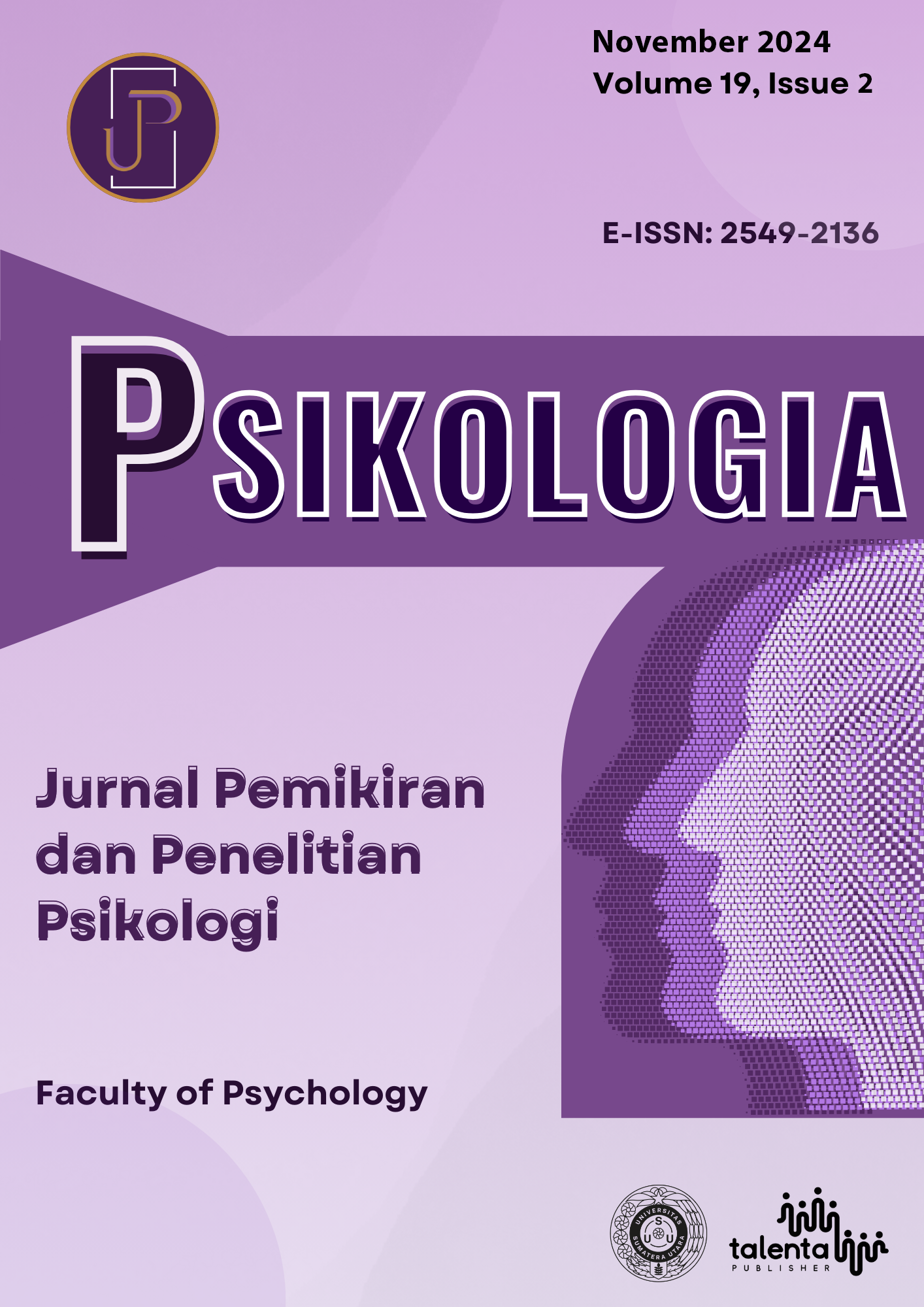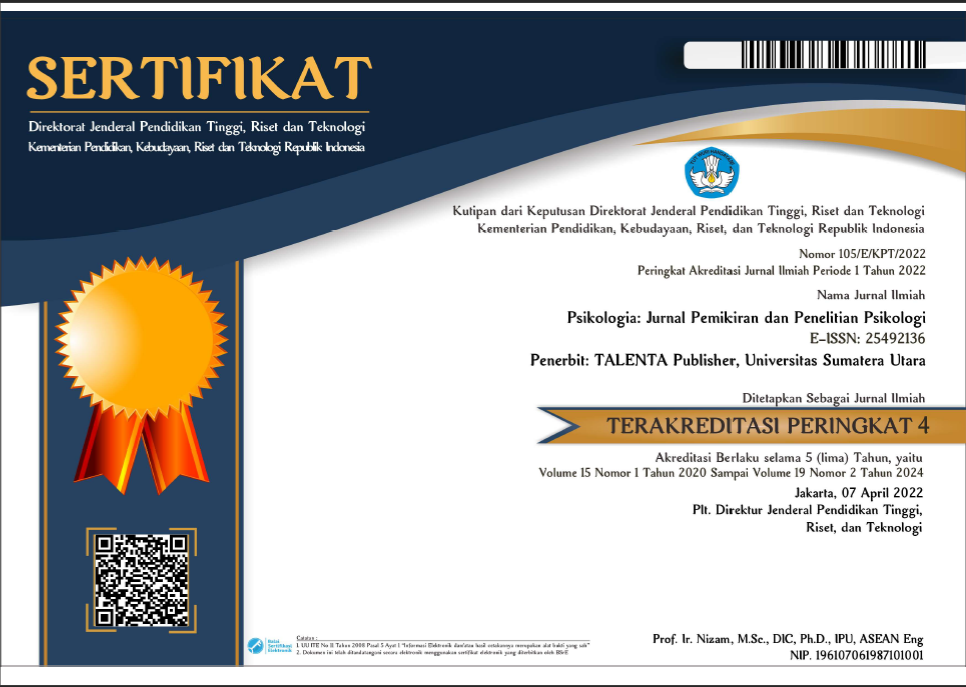Contextualizing primary school teachers’ perception of the parent-child relationship
DOI:
https://doi.org/10.32734/psikologia.v19i2.18797Keywords:
teachers' perception, relationship, parents, childrenAbstract
The most crucial relationships for students' social and emotional development and wellbeing are those between parents and pupils. While there is a wealth of research on programs to enhance parent-child connections, few are designed for use by educators in early education and care settings. This study aims to describe teachers' comprehension of the parent-child relationship concerning social and emotional development, the teacher's role in fostering the parent-child relationship, and the forms of teacher support in the parent-child relationship. This research method is a qualitative descriptive study with a phenomenological design involving six school principals and twenty teachers at the elementary education level as research subjects. The results showed that early education teachers were reluctant to contact parents, although acknowledging the importance of parent-child interactions. Teachers tended to be unwilling to impart their knowledge to parents since it was primarily implicit and derived from observations and real-world experiences. Teachers want theoretical, supported evidence methods to deepen their understanding and enhance everyday activities that strengthen parent-child interactions. The results are crucial for creating a parent-child connection program led by educators for implementation in educational and childcare facilities. A comprehension of educators' regular practices, their function in promoting parent-child connections, and children's social and emotional development should be explored to guide the creation of an educator program. These results are crucial for creating a parent-child connection program developed by educators for use in educational and childcare settings.
Downloads
References
Alharthi, M. (2023). Parental involvement in children’s online education during COVID-19: A phenomenological study in Saudi Arabia. Early Childhood Education Journal, 51(2), 345–359. https://doi.org/10.1007/s10643-021-01286-y
Alwaely, S. A., Yousif, N. B. A., & Mikhaylov, A. (2021). Emotional development in preschoolers and socialization. Early Child Development and Care, 191(16), 2484–2493. https://doi.org/10.1080/03004430.2020.1717480
Björklund, C., van den Heuvel-Panhuizen, M., & Kullberg, A. (2020). Research on early childhood mathematics teaching and learning. ZDM - Mathematics Education, 52(4), 607–619. https://doi.org/10.1007/s11858-020-01177-3
Brackett, M. A., Bailey, C. S., Hoffmann, J. D., & Simmons, D. N. (2019). RULER: A theory-driven, systemic approach to social, emotional, and academic learning. Educational Psychologist, 54(3), 144–161. https://doi.org/10.1080/00461520.2019.1614447
Cairns, D. (2019). Investigating the relationship between instructional practices and science achievement in an inquiry-based learning environment. International Journal of Science Education, 41(15), 2113–2135. https://doi.org/10.1080/09500693.2019.1660927
Çiftçi, A., Topçu, M. S., & Foulk, J. A. (2022). Pre-service early childhood teachers’ views on STEM education and their STEM teaching practices. Research in Science and Technological Education, 40(2), 207–233. https://doi.org/10.1080/02635143.2020.1784125
Comer, J. S., Hong, N., Poznanski, B., Silva, K., & Wilson, M. (2019). Evidence-based update on the treatment of early childhood anxiety and related problems. Journal of Clinical Child and Adolescent Psychology, 48(1), 1–15. https://doi.org/10.1080/15374416.2018.1534208
Formosinho, J. (2021). From schoolification of children to schoolification of parents? Educational policies in COVID times. European Early Childhood Education Research Journal, 29(1), 141–152. https://doi.org/10.1080/1350293X.2021.1872677
Gross, D., Bettencourt, A. F., Taylor, K., Francis, L., Bower, K., & Singleton, D. L. (2020). What is parent engagement in early learning? Depends who you ask. Journal of Child and Family Studies, 29(3), 747–760. https://doi.org/10.1007/s10826-019-01680-6
Hu, B. Y., Johnson, G. K., Teo, T., & Wu, Z. (2020). Relationship between screen time and Chinese children’s cognitive and social development. Journal of Research in Childhood Education, 34(2), 183–207. https://doi.org/10.1080/02568543.2019.1702600
Joo, Y. S., Magnuson, K., Duncan, G. J., Schindler, H. S., Yoshikawa, H., & Ziol-Guest, K. M. (2020). What works in early childhood education programs? A meta-analysis of preschool enhancement programs. Early Education and Development, 31(1), 1–26. https://doi.org/10.1080/10409289.2019.1624146
Kawasaki, H., Yamasaki, S., Rahman, M. M., Murata, Y., Iwasa, M., & Teramoto, C. (2020). Teachers-parents cooperate in disaster preparation when schools become evacuation centres. International Journal of Disaster Risk Reduction, 44(November 2019), 101445. https://doi.org/10.1016/j.ijdrr.2019.101445
Mas, J. M., Dunst, C. J., Balcells-Balcells, A., Garcia-Ventura, S., Giné, C., & Cañadas, M. (2019). Family-centred practices and the parental wellbeing of young children with disabilities and developmental delay. Research in Developmental Disabilities, 94(September), 103495. https://doi.org/10.1016/j.ridd.2019.103495
McGarr, O. (2021). Using virtual simulations in teacher education to develop pre-service teachers' behaviour and classroom management skills: Implications for reflective practice. Journal of Education for Teaching, 47(2), 274–286. https://doi.org/10.1080/02607476.2020.1733398
McKown, C. (2019). Challenges and opportunities in the applied assessment of student social and emotional learning. Educational Psychologist, 54(3), 205–221. https://doi.org/10.1080/00461520.2019.1614446
Nguyen, T., Schleihauf, H., Kayhan, E., Matthes, D., VrtiÄka, P., & Hoehl, S. (2020). The effects of interaction quality on neural synchrony during mother-child problem-solving. Cortex, 124, 235–249. https://doi.org/10.1016/j.cortex.2019.11.020
Pedersen, G. A., Smallegange, E., Coetzee, A., Hartog, K., Turner, J., Jordans, M. J. D., & Brown, F. L. (2019). A systematic review of the evidence for family and parenting interventions in low- and middle-income countries: Child and youth mental health outcomes. Journal of Child and Family Studies, 28(8), 2036–2055. https://doi.org/10.1007/s10826-019-01399-4
Silver, H. C., & Zinsser, K. M. (2020). The interplay among early childhood teachers' social and emotional wellbeing, mental health consultation, and preschool expulsion. Early Education and Development, 00(00), 1133–1150. https://doi.org/10.1080/10409289.2020.1785267
Sökmen, Y. (2021). The role of self-efficacy in the relationship between the learning environment and student engagement. Educational Studies, 47(1), 19–37. https://doi.org/10.1080/03055698.2019.1665986
Sujarwo, Kusumawardani, E., & Nurmalasari, Y. (2022). Is the motivation and parental involvement affected by distance learning media during pandemic COVID-19? Cakrawala Pendidikan, 41(2), 481–493. https://doi.org/10.21831/cp.v41i2.46265
Suyadi, & Selvi, I. D. (2022). Online learning and child abuse: the COVID-19 pandemic impact on work and school from home in Indonesia. Heliyon, 8(1), e08790. https://doi.org/10.1016/j.heliyon.2022.e08790
Vaezghasemi, M., Vogt, T., Lindkvist, M., Pulkki-Brännström, A. M., Richter Sundberg, L., Lundahl, L., Silfverdal, S. A., Feldman, I., & Ivarsson, A. (2023). Multifaceted determinants of social-emotional problems in preschool children in Sweden: An ecological systems theory approach. SSM - Population Health, 21(January), 1–13. https://doi.org/10.1016/j.ssmph.2023.101345
Watts, L. (2019). Reflective practice, reflexivity, and critical reflection in social work education in Australia. Australian Social Work, 72(1), 8–20. https://doi.org/10.1080/0312407X.2018.1521856
Downloads
Published
How to Cite
Issue
Section
License
Copyright (c) 2024 Erikson Saragih, Haida Umeira Hashim, Ayesha Junaid, Tiarnida Nababan, & Tiorika Nababan

This work is licensed under a Creative Commons Attribution-ShareAlike 4.0 International License.









